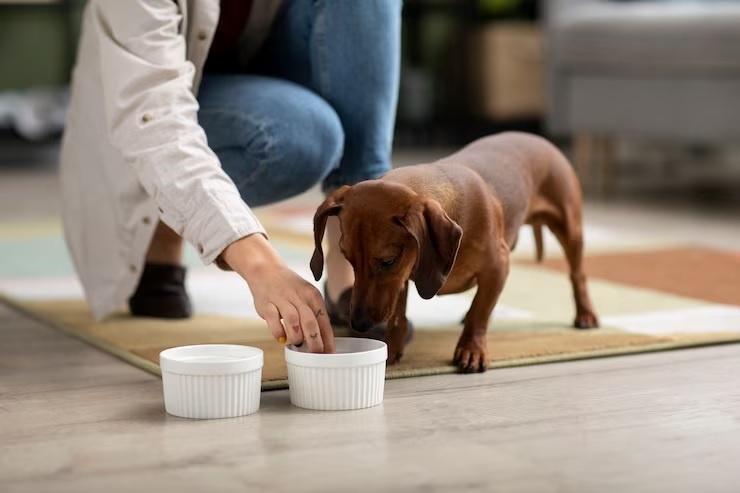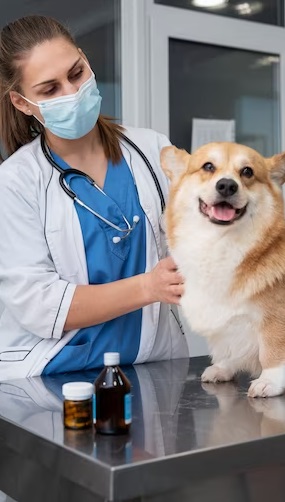
Probiotics for Pets: Unveiling the Benefits of Gut Health
In the past few decades, the addition of probiotics in the life of pets has gained a lot of attraction not only in human health but also in animals. These beneficial microorganisms are very important and play a great role in supporting digestive health, improving mental well-being, and strengthening the immune system. However, did you know that the benefits of these probiotics are beyond your expectations? Probiotics are now used in pets regularly and they are enhancing the well-being of your furry friend. In this blog, you will know about the probiotics for pets and how are they impacting their life.
The Gut Microbiome: A Crucial Player in Health
Before diving into the world of probiotics for pets it is important to learn about the concept of the gut microbiome. The gut microbiome mentions the diverse community of microorganisms that includes fungi, bacteria, and viruses residing in the gastrointestinal tract. This ecosystem is complex but it has a great role in maintaining the overall of pets. Just like in humans, the microorganisms present in the gut of animals play a role in nutrient absorption and influence digestion, immune response, and even mental health.
Probiotics Defined: What Are They?
Probiotics are defined as “good bacteria”, and they are live organisms that offer a lot of health benefits when consumed in proper amounts by pets. They work by boosting the natural stability of microbes in the gut by preventing the growth of bad bacteria and promoting the good ones. Probiotics come in different strains, and each has its own unique benefits.
The Case for Probiotics in Pets
While research on probiotics in pets is still going on but the initial findings are very promising. Probiotics for pets have the potential to address many health issues, from digestive disorders to immune system support. According to a study by Dr. Sarah Cottrell, who is a veterinary nutritionist states that “Just like humans a balance of gut microbiome is crucial of well-being of pets. Probiotics also help in maintaining and achieving this balance.”

Benefits of Probiotics for Pets
Digestive Health
One of the basic benefits of probiotics in the life of pets is their capability to promote digestive health. Just like humans, pets can also suffer from gastrointestinal issues like constipation, diarrhea, and irritable bowel syndrome. Probiotics have a great effect in reducing gut inflammation, regulating bowel movements, and improving the nutrient absorption capacity of the gut. According to a study published in the veterinary medicine journal, “Those dogs that are fed with specific probiotics strains have shown a great reduction in the severity of diarrhea.


Immune System Support
A properly working immune system is necessary for pets to keep diseases and infections at bay. Probiotics not only help in enhancing the function of the immune system by stimulating the production of immune cells and also by promoting the secretions of antibodies. According to neuroscientist, Dr. Jane Foster who is a specialist in gut-brain function emphasize that “a healthy gut microbiome is attached to a strong immune system and this goes for pets as well. Probiotics overall help pets in fighting against illness.”
Allergy Alleviation
Allergies can occur in humans as well as in animals and pets can suffer from food and skin allergies. Some new studies suggest that if there is an imbalance gut microbiome it will cause allergies in pets. In such situations, probiotics can moderate the immune response and decrease the likelihood of allergies. A study published in the Journal of Animal Science shows that those pets that get probiotics in their diet regularly will experience a reduction in the severity of allergic skin reactions.


Anxiety and Stress Management
You may be surprised to know that, pets can also suffer from stress and anxiety, and that occurs due to a change in their routine and environment. The connection between the gut and the brain is an interesting area of research and studies prove that healthy gut microbiomes have positive effects on behavior and mood. Dr. Rebecca Johnson, a veterinary behaviorist suggests that probiotics have a great role in reducing anxiety-related issues in pets by regulating the gut-brain axis.
Choosing the right Probiotics for your Pet
Selecting the right probiotic for your pet involves many factors that include your pet’s age, species, health condition, and specific probiotic strain that matches their needs. It is important to consult with your vet to determine one of the suitable probiotics need for your furry friend. According to Dr. Mark Davis a veterinary microbiologist who advises that “Not all probiotics are created equal, and the probiotics strains that work well for one pet might not work well for the other pet.”
Sources of Probiotics for Pets
Probiotics for pets can be found in various forms, including:
- Commercial Pet Foods: There are pet foods that are specially formulated with added probiotics. These are very easy to take and have all the beneficial microorganisms in them.
- Probiotic Supplements: Different probiotic supplements are available for pets in the form of powders, capsules, and chews. They give a proper dosage of probiotics.
- Fermented Foods: Fermented food like kefir or yogurt has probiotics that are very beneficial for pets.

FAQS
Can pets be given human probiotics?
Yes, you can give human probiotics to pets and they are not harmful. However, they will not give the same benefits to pets as they give to humans because dogs and cats have different gut systems than humans. On the other hand, probiotics that are specifically designed for pets have all the appropriate dosages written on the labels.
Is yogurt a probiotic for pets?
Yogurt is an excellent probiotic for humans and it provides us all the good bacteria we need. However, in the case of pets yogurt will not provide the same benefits as pets don’t have the same digestive system as humans. Although yogurt is not toxic as long as it is given in moderation, however, yogurt has lactose that can cause digestive issues for many dogs, so offer it in small amounts, and if there are any problems stop it.
Can you give probiotics to puppies?
Yes, you can give probiotics to puppies. Some vets recommend probiotics for puppies as their life is full of adventures and testing new food and different experiences can cause stress and problems in the digestive system. In such situations, probiotics can help however always consult your vet before introducing anything new to their diet.

Conclusion
As our understanding of the importance of gut health grows, so does our recognition of the potential benefits of probiotics for pets. While more research is needed to fully elucidate the extent of these benefits, current studies indicate that probiotics can play a valuable role in supporting the digestive, immune, and emotional well-being of our beloved animal companions. Remember, a healthy gut translates to a happier and healthier pet. However, before starting any new regimen, it’s crucial to consult with a veterinarian to determine the most suitable probiotic approach for your specific pet.
About the Author:
Savanna Westwood
Savanna Westwood is the Owner and Founder of The Savvy Sitter, Pet Sitting and Dog Walking, LLC. She has grown up with animals all her life and enjoys spending time with them. Savanna has lived in the Winter Garden and Windermere Area for over 30 years. When she is not taking care of Fur Friends, one can find her reading, practicing archery, riding, and devising ways to provide additional and excellent services to clients. Savanna is a Certified Professional Pet Sitter with Pet Sitter International's CPPS certification and also holds certification in Pet First Aid and CPCR for Pet-Care Professionals.

